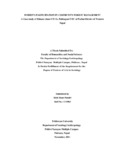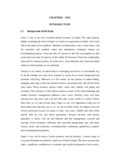Please use this identifier to cite or link to this item:
https://elibrary.tucl.edu.np/handle/123456789/2832| Title: | Women’s Participation in Community Forest Management A Case Study of Ekkane Chaur Cfug, Pakhapani Vdc of Parbat District of Western Nepal |
| Authors: | Paudel, Rishi Ram |
| Keywords: | women’s participation;Community Forest User Groups;Parbat District;Women in Development;Panchyat Protected Forest;Forest Management |
| Issue Date: | 2011 |
| Abstract: | People’s participation especially the women’s participation has been recognized as an important aspect of community forest management and development discourse for the last decade. Women’s participation is expected in all dimensions such as planning and decision-making, implementation, monitoring, evaluation and benefit sharing aspects. In this context this study was conducted in the Akkanechaur Community Forest User Groups of Pakhapani VDC of Parbat District with the aim of assessing women’s participation in community forest management. The study is descriptive by nature in the sense that it includes survey and fact-finding inquiries on selected issues. In order to meet quantitative and qualitative requirements, both primary and secondary sources of data were used in the study. Conducting household survey, focus group discussion, Key informant interview and observation methods were used to collect primary data. Likewise, published and unpublished documents were reviewed to gather secondary information. The study has revealed that women of forest user group were aware of the multilateral importance of community forest. However, they were not adequately aware of the constitution, operational plan and other technical aspects of community forest management and development. Such ignorance and dependency will prevail for a long period, if the existing system continues. The status of women’s participation in implementation process was high while the rate of participation in decision-making processes was low. Participation of ordinary women in monitoring and evaluation process and participation in general assembly’s was not found satisfactory. Usually, social activities conducted by CFUG were found to have benefited to both sexes. Women member of the CFUG had not received opportunity to participate in training and study tours. The CFUG has mobilized more physical participation of women in community forest management. Despite some personal, family, social and policy level constraints, women were involved in CF management due to synergetic efforts of self-inspiration and daily requirements of the forest products. In order to open women’s introvert nature, it is required to explore their attitude and ambitions, utilize women’s knowledge and skills, address the obstacles, and maximize the women’s participation in CF management. Equal efforts are expect from all stakeholders. Recommendations related to constitution reformulation, policy, regulations and strategy are provided to policy-making bodies. Implementation based recommendations such as involving women as EC member in adequate proportion even in major portfolios, women mobilization in OP preparation and its periodic review, and disseminating CF and people’s mobilization related recommendations are assigned to GOs/NGOs. Psychological closeness between women and forest resources was observed during the study. Women’s participation was found determined extremely with socio-economic condition, institutional culture of CFUG and status of women in the family. Women posses basic inspiration, knowledge and skill regarding forest resource management. Reinforcement of women’s existing knowledge and skill, and boosting the existing attitude and ambition of women regarding CF management at local level definitely can play a significant role to restore and enhance the effective management of the forest resources. |
| URI: | http://elibrary.tucl.edu.np/handle/123456789/2832 |
| Appears in Collections: | English |
Files in This Item:
| File | Description | Size | Format | |
|---|---|---|---|---|
| cover1.pdf | 196.06 kB | Adobe PDF |  View/Open | |
| Thesis of Rishi paudel final.pdf | 846 kB | Adobe PDF |  View/Open |
Items in DSpace are protected by copyright, with all rights reserved, unless otherwise indicated.
